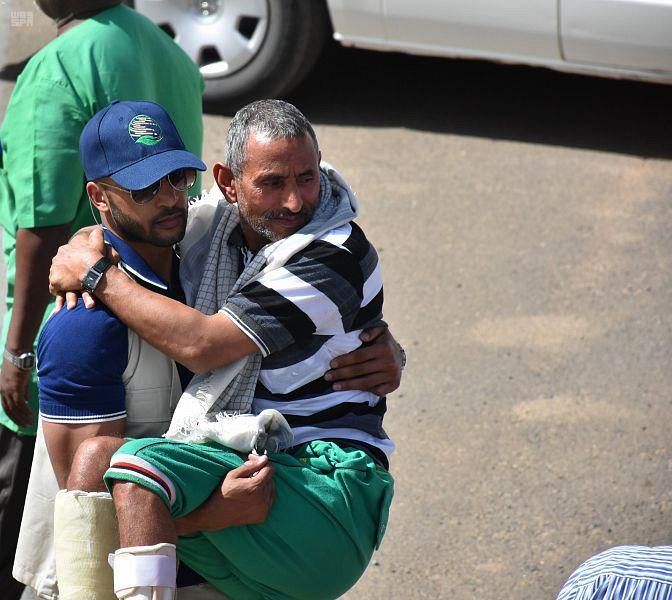
In December 2017, the Saudi capital Riyadh hosted two important meetings to draft a humanitarian plan for Yemen.
The coalition for restoring legitimacy in Yemen presented to officials traveling from the UN a plan that seeks to go beyond simply providing aid. It seeks to improve living conditions in Yemen, as well as implement development and economic plans. The plan will effectively reach all regions without discrimination and provide safe passages and improve and develop current ones.
After a series of meetings and studies, the Isnad center was established with the purpose of implementing a comprehensive humanitarian operation throughout Yemen. A number of media appearances, interviews and social media posts were made to highlight this initiative.
The United Nations has since the Houthi coup of September 2014 been operating in Yemen as part of what activists said was a “temporary” plan.
Representative of the UN Office for the Coordination of Humanitarian Affairs Jamie McGoldrick, who recently completed his mission in Yemen, said that the organization had worked tirelessly with its partners to meet the demands of 10 million Yemeni people in the past year.
He added that operations targeted the most vulnerable people, but acknowledged that workers in the humanitarian field had limited means and resources. The only way to meet the needs of the people is through ending the war and resuming political consultations.
Yemeni activist Al-Bara Shiban responded to McGoldrick, saying that UN relief agencies tried to show that resolving the Yemeni conflict starts by ending the humanitarian crisis. They fail to see that the failure of the political process is the cause of the war.
Ending the conflict therefore should not always be addressed from the humanitarian angle because the humanitarian crisis was caused by the failure of the political process, he added.
They are therefore not addressing the real source of the problem, which is the coup that dragged the country towards its current humanitarian crisis, he stressed.
“We feel as if the priorities of the UN relief agencies are not the same as that of many Yemeni people. For example, attention has been greatly focused on the humanitarian issue, while ignoring the rehabilitation of state institutions. Restoring the functioning of these institutions is much more important than relief programs,” he declared.
Restoring them back to normal is part of a long-term solution, while relief programs are only temporary, Shiban said.
Another Yemeni social activist, Fayza al-Suleimani, stated: “Innovative solutions must be considered. State institutions should be supported because the local authorities are the main guarantors and they primarily play a role in building and sustaining the complete development system.”
“The humanitarian crisis emerged due to the absence of the state in Yemen and due to the Houthi coup,” she stressed.
Given these discrepant stances, Isnad was introduced to offer emergency aid and pave the way for a plan that would restore hope for Yemen.
The Isnad plan is more than just an offer for aid, but it is an innovation. The Arab Coalition is speaking about some 15,000 job opportunities that are offered in just one project related to roads.
Economic aid meanwhile started with a $2 billion grant for Yemen’s central bank and $1.5 billion for the UN. In addition, a relief bridge has been opened for around week.
It witnessed the delivery of aid to islands that had never dreamed of receiving such services or help, said Yemeni activists.
Saudi Ambassador to Yemen and Isnad CEO Mohammed al-Jaber explained that its humanitarian program is based on a “long-term plan that includes that encompasses the central bank and 17 safe passages that start from six main centers.”
He told Asharq Al-Awsat that with cooperation with the legitimate Yemeni government, passages for UN convoys can be opened any time they want and according to a schedule. The UN should coordinate with the Houthis if it wants to send aid to Houthi-controlled regions.
“We held two workshops with the UN through Isnad. The center seeks to support all international organizations, including the King Salman Humanitarian Aid and Relief Center,” he stressed.
Meanwhile, a western official in London stressed that Saudi Arabia understands the humanitarian situation in Yemen.
Asked to comment on the comprehensive humanitarian plan that was recently unveiled by the Arab Coalition, he said that the “humanitarian plan is good,” but Hodeidah needs to operate as a main port.
The official, who spoke on condition of anonymity, said that the port is currently operating at 70 percent of the capacity it was at in November.
The port was temporarily closed after the Houthis fired a ballistic missile against Riyadh.
A UN official, who also spoke on condition of anonymity, deemed as “excellent” the plan on providing safe passage for aid delivery “should the Houthis respect it when the convoys pass through their territories.”
This also hinges of the monitoring UN agency and whether it is accurate in reporting violations.







